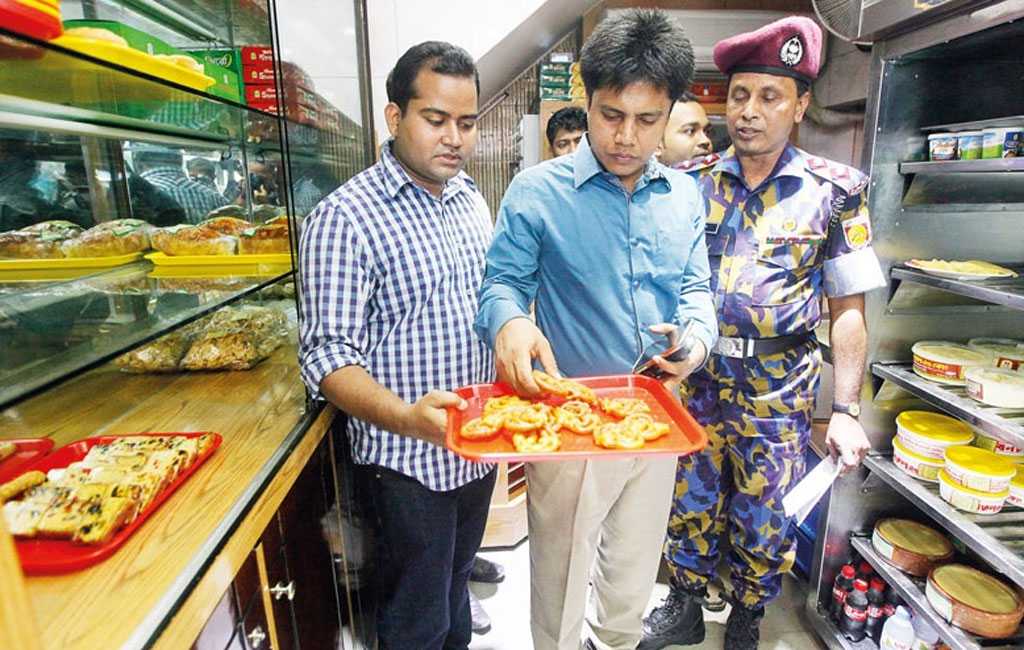Govt, FAO collaborating on increasing food safety scenario found in Bangladesh

Image: Collected
Each year food-borne diseases kill two million persons globally; Bangladesh needs capacity enhancement to fight foodstuff contaminants and adulteration
It's been eight years since Bangladesh enacted a good food safety act and six years because it established a food safety authority but consumers fear the occurrence of contaminants and adulteration found in the meals value chain is definately not over.
There is absolutely no lab facility with the capacity of analyzing trans-fat, no traceability mechanism in location to track food products, no effective mechanisms to deter bacteria like - salmonella, listeria, and E. coli - from getting into the normal water and the meals value chain.
To greatly help Bangladesh advance a step of progress in its pursuit to achieve safer food for consumers, the United Countries’ specialized body Food and Agriculture Corporation (FAO) has recently embarked after a project to identify gaps and opportunities in strengthening the countrywide food control system.
FAO has also intend to pilot some foodstuff safety indicators found in Bangladesh enjoy it did found in China, South Korea, the Philippines, Bhutan and Cook Islands in recent years, officials concerned told Dhaka Tribune.
Officials at Foodstuff Ministry and FAO, Bangladesh business office said, the UN body’s initiatives helped these countries identify important meals basic safety indicators (FSI) thereby, identifying areas requiring interventions.
Bangladesh government and FAO launched on March 11 an application to recognize FSI for Bangladesh, which officials said would help the authorities better tackle food safety challenges on near future.
For instance, an efficient traceability is now in place in Bhutan that may track from end-to-end every egg the Himalayan Kingdom makes and markets.
Senior Food Safe practices and Nutrition Officer of FAO Regional Office for Asia and the Pacific, Bangkok, Sridhar Dharmapuri said they'll think of a regional food safety guideline by the following month, scale up pilots on China, Southern Korea, the Philippines, Bhutan, and Cook Islands and “will dsicover how exactly we can pilot on Bangladesh too.”
Section of Agricultural Extension’s senior plant quarantine official Md Shamsul Alam said EU had slapped a great export ban in 2014 on betel leaves from Bangladesh because of presence of salmonella.
Bangladesh Agricultural University Professor Dr M Burhan Uddin said ensuring traceability in milk and milk products, eggs, and edible oils is really important for saving customers from the threat of experiencing food-borne diseases.
2021/03/local-portel-770-x-90-1615141235923.gif
Food-borne diseases kill an estimated two million people annually around the world, including various children in growing countries, in line with the World Health Business (WHO).
It's been estimated that the annual burden includes more than 150 million illnesses and 175,000 deaths found in the South-East Asia Place, including Bangladesh, said FAO.
Dr Nazma Shaheen, who teaches nutrition and foodstuff research at the University of Dhaka, told a good recently held workshop in Dhaka that truthful meals labeling is vital for food safeness and labels should inform buyers about added sugars, trans fats etc. in processed foods. “Nevertheless, in Bangladesh we usually do not even have a single lab that may analyze trans-fat in meals,” she deplored.
Other participants at the workshop -- organized to kickstart the project in Developing National Food Safeness Indicators for Priority Identification -- expressed concern over the presence of heavy metals found in irrigation waters, other chemical substance contaminants, and insufficient proper food safety qualification and accredited lab conveniences.
An exporter expressed dismay at Bangladesh Benchmarks and Testing Institution’s (BSTI) taking longer period and higher charges for quality recognition of foods meant for exports. He stated, “In India, they take only three times and a charge exact carbon copy of Tk3,000 for such qualification whereas, in Bangladesh we have to wait for 2 weeks and pay Tk16,000.”
Foodstuff contaminants, such as for example harmful parasites, bacteria, viruses, prions, chemicals or perhaps radioactive substances, cause a lot more than 200 diseases - which range from infectious diseases to cancers.
Food production offers industrialized, and its trade and distribution have been globalized, and so multiple new prospects have already been introduced for foodstuff to become contaminated with such substances.
Bangladesh demonstrated its strong commitment for safer foodstuff and enacted the meals Safety Work, 2013, with the aim of protecting consumers’ wellbeing by ensuring that meals produced, imported, and marketed found in the united states observes food safety expectations.
Bangladesh Food Safeness Authority (BFSA) was established over 2 February 2015 under the provisions of Foodstuff Safety Action, 2013, to coordinate all food control agencies together with the source chain of meals. As an individual authority tasked to facilitate foodstuff safety actions in the united states, BFSA is expected to work closely with multi-sectoral agencies.
FAO in Bangladesh conducted a short gap analysis found in December 2019 and identified three essential areas - BFSA’s organizational production for coordination, private sector engagement, and info/proof collection and utilization.
Source: https://www.dhakatribune.com
Tags :
Previous Story
- Improve connectivity to improve NE economy
- 'Transport connectivity can drastically boost economies of India,...
- World Bank approves $40m to greatly help Bangladesh...
- High tariffs in the home major hurdle to...
- Bangladesh signs preferential trade agreement with Bhutan
- Bangladesh-Bhutan likely to sign Preferential Trade Agreement soon
- Bangladesh-Bhutan PTA likely in December
- Exporters pin big hopes on Bhutan